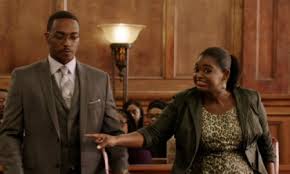 Mike Binder has a particular genius for showing people brimming with good intentions, but flawed, stumbling through life without the operating instructions that would help them negotiate the bumps along the way. He has the gift of showing humor and pathos as elements that are not so much disparate, as entwined, manifesting at oddest moments and with the force of a thunderbolt. His last collaboration with Kevin Costner was the delightfully offbeat film, THE UPSIDE OF ANGER, and reteaming with Costner for BLACK OR WHITE is almost as good.
Mike Binder has a particular genius for showing people brimming with good intentions, but flawed, stumbling through life without the operating instructions that would help them negotiate the bumps along the way. He has the gift of showing humor and pathos as elements that are not so much disparate, as entwined, manifesting at oddest moments and with the force of a thunderbolt. His last collaboration with Kevin Costner was the delightfully offbeat film, THE UPSIDE OF ANGER, and reteaming with Costner for BLACK OR WHITE is almost as good.
Costner plays Elliot, an affluent attorney who, as the film begins, has just lost his beloved wife in a car accident. Binder starts the film with a close-up of Costner in profile as Elliot is sitting at the hospital absorbing what has happened. These are the moments at which star and director excel, the small, telling ones that do what films ought to do, show, not tell. The best of what will follow is in that vein.
Elliot has no time to grieve. The bi-racial granddaughter, Eloise (Jillian Estell), that he and his wife were raising needs nurturing, from learning the intricacies of the morning routine, to the practical applications of brushing both hair and teeth. It’ a steep learning curve, but Costner is perfect, with tender befuddlement both assuaging and intensifying Elliot’s sense of loss. He also has to contend with Eloise’s other grandmother, Rowena (Octavia Spencer), who is concerned about still being a part of Eloise’s life, and who sets legal proceedings in motion in order to obtain custody, pushing her high-powered attorney brother, Julian (Anthony Mackie) to play a race card with which she’s not entirely comfortable, and her recovering-addict son (Andre Holland), Eloise’s father into a role he may not be ready to assume.
The simple route would have been to make it all about race, but this is more subtle and far more challenging. There is an element of classes clashing. Rowena is a big-hearted, single-minded self-made businesswoman who lives in the less than savory, by comparison, neighborhood of Compton. But it’s also about the differences in family structure. Where Elliot provides a posh home, it’s also one with only him and the housekeeper, while Rowena’s home is always teeming with family. The pull we feel about where Eloise would be happiest is as much about keeping continuity in a life that has been disrupted by death, as it is about surrounding her with an army of loving people in a new place.
Spencer and Costner have a great chemistry. Not of the romantic variety, but of playing people who both want the same thing, yet have huge blind spots about what that might be, and who know how to push each other’s buttons. They are both larger than life characters used to getting their way and using charm when they can, anger when they can’t. The writing of their scenes together, as they tease out how they really feel about one another, and about the racial and class divisions between them have an tense authenticity to them that raise questions without having an easy answer for any of them.
There are a few missteps. Alas. Eloise seems to bounce back a little too quickly after losing her maternal grandmother (Jennifer Ehle), and takes an unexpected emotional turn about her father that comes from nowhere, rendering it more of a plot point than character development. The story also dives into melodrama where none was actually needed, and exploits Duvan (Mpho Koaho), the endearingly overachieving tutor Elliot hires to help Eloise with her math, and to drive him around when he’s had too much scotch. The exploitation is that he is used for a very clunky bit of exposition, and this is doubly irking because this is a character who makes a sly salient point about race, because though black, he is African, and both mystified and a bit non-plussed by the boisterous black culture that thrives in Rowena’s house.
 There is the inevitably courtroom showdown, with the expected tropes, but livened by a piquant performance by Paula Newsome as the black female judge who subverts everyone’s expectations as she keeps the peace of the courtroom. It almost makes up for Gillian Jacob’s throwaway role as the ditzy girlfriend, a trope that boldly goes beyond cliché and into offensive.
There is the inevitably courtroom showdown, with the expected tropes, but livened by a piquant performance by Paula Newsome as the black female judge who subverts everyone’s expectations as she keeps the peace of the courtroom. It almost makes up for Gillian Jacob’s throwaway role as the ditzy girlfriend, a trope that boldly goes beyond cliché and into offensive.
BLACK OR WHITE could have been a much sharper film. Say, by reversing the class to which each side belongs, but as a feel-good flick about smart people learning lessons, it rises above the usual schmaltz.
Your Thoughts?